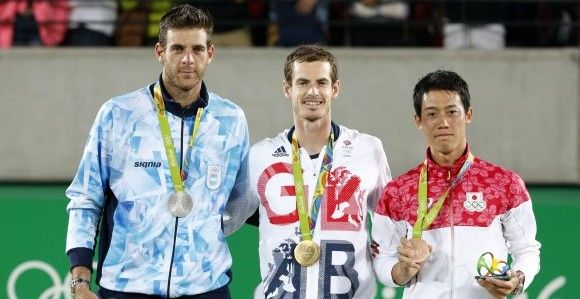MASTER TENNIS COACH CRAIG CIGNARELLI’S VIEW OF THE RIO OLYMPICS
 MASTER TENNIS COACH CRAIG CIGNARELLI'S VIEW OF THE RIO OLYMPICS
MASTER TENNIS COACH CRAIG CIGNARELLI'S VIEW OF THE RIO OLYMPICSepa05485745 Gold medal winner Andy Murray (C) of Great Britain flanked by silver medal winner Juan Martin del Potro (L) of Argentina and bronze medal winner Kei Nishikori (R) of Japan pose for a photo after the awarding ceremony of men's singles gold medal match of the Rio 2016 Olympic Games Tennis events at the Olympic Tennis Centre in the Olympic Park in Rio de Janeiro, Brazil, 14 August 2016. EPA/MICHAEL REYNOLDS |
Gold medal winner Andy Murray (C) of Great Britain flanked by silver medal winner Juan Martin del Potro (L) of Argentina and bronze medal winner Kei Nishikori (R) of Japan pose for a photo after the awarding ceremony of men’s singles gold medal match of the Rio 2016 Olympic Games Tennis events at the Olympic Tennis Centre in the Olympic Park in Rio de Janeiro, Brazil, 14 August 2016. EPA/MICHAEL REYNOLDS
Ask Not What Your Country Can Do For You
Around the water cooler, there’s been a lot of talk about the meaning of Olympic tennis. Some say it is not the pinnacle of the sport, that the four majors offer significantly more value to the players, and the world’s best professionals handle an Olympic loss far better than a slam loss. Perhaps these conversational hobbyists have a point. If we study the tear-stained faces of the losers, the hung heads and slow walks back to the tunnel, the post-match interviews which see them struggling to speak before the cameras as their national flag rests behind them, it is clear the Olympics have little meaning. When we see their twisted mouths and watery eyes as they claim victory over another nation’s stalwarts, when we watch them move toward the crowd to emerge with their nation’s flag and then drape that symbol around their shoulders as they traipse across the court with a pride few humans can comprehend, when they stand upon the podium and stare into the wind-blown cloth of their home country and listen to the tunes which inspired them since childhood, which they sung in school and listened to with hands over their hearts as they attempt to hold back tears before letting them drip down red, exhausted cheeks, it is clear the Olympics have little meaning.
When tennis first appeared on the modern day Olympic stage – in fact it was in play from 1896 to 1924 – spectators figured it would be more of a demonstration sport. Over time, a few of the world’s best came out to chase down medals and to represent their nations. Today though, things have changed. The world’s best are all there now. Novak, Andy, and Rafa, Serena and Angelique, and now fan favorites Juan Martin Del Potro, Monica Puig and Stevie Johnson. They are not here for the money. They are not here for ATP and WTA points nor some major title. No. They come for a piece of history which dates back to the days of the ancients, when togas were in and people named Kokkinakis were commonplace. They come for a small piece of gold and a place atop the mantle of athleticism. They come where the world’s best athletes in all genres gather to challenge one another, where the idea of competing for oneself suddenly bends and breaks before the battle for national pride. In short, they come because four years is an awfully long time to wait for a chance to bring home a small gold circle of global dominance. Want to know whether the Olympics has meaning? Ask Puerto Rico. Ask Great Britain. Ask all of the athletes who don’t have a weight-laden lanyard hanging from their neck this week. They will tell you the answer. And then they’ll get back to the practice courts to prepare for Tokyo 2020.
(L-R) Horia Tecau and Florin Mergea of Romania (silver), Marc Lopez and Rafael Nadal of Spain (gold) and Steve Johnson and Jack Sock of the US (bronze) on the medal stands after the Rio 2016 Olympic Games Men’s Doubles at the Olympic Tennis Centre in the Olympic Park in Rio de Janeiro, Brazil, 12 August 2016. EPA/MICHAEL REYNOLDS
Gold medalist Monica Puig of Puerto Rico on the podium during the medal ceremony for the women’s Singles competiton of the Rio 2016 Olympic Games Tennis events at the Olympic Tennis Centre in the Olympic Park in Rio de Janeiro, Brazil, 13 August 2016. EPA/MICHAEL REYNOLDS
Topics: 10sballs.com, Craig Cignarelli, Rio 2016, Rio Olympics, Sports, Tennis News


10sBalls Top Stories
- Reasons Behind the Increase in Sex Shops
- Reasons Behind the Increase in Sex Shops
- Reasons Behind the Increase in Sex Shops
- Casibom: Yaşayan Casinolar ve Bahisler Lider Platform
- Sea Star Casino: Play Games Without Registering Online
- JETZT DEN SWEET BONANZA SLOT GRATIS DREHEN
- Азартные игры с Мостбет Казино – испытайте удачу
- Çevrimiçi en iyi yuvalar: Hizmetinizde Karavan Bet Casino
- Top No Deposit Free Spins Offer for Canadians – December 2024
- Abe Bet Casino: Ücretsiz dönüşlerle heyecan hissedin
- Ünlü slotlar çevrimiçi kumarhanelerde başarı bet giriş ücretli formatta
- BasariBet Casino Giriş – En Güzel Canlı Casino Oyunlarına Katılın
- Игра на деньги в казино 1вин казино: безопасность
- De parking de credits sans oublier les Diction Casino Archive sauf que Perception
- Играть в хитовые слоты в надежных клубах azino777







RT @10sBalls_com: Master #Tennis Coach @CraigCignarelli’s View Of The #RioOlympics2016
https://t.co/pSdAkAfaDZ
@Rio2016_en #Rio2016 https…
RT @10sBalls_com: Master #Tennis Coach @CraigCignarelli’s View Of The #RioOlympics2016
https://t.co/pSdAkAfaDZ
@Rio2016_en #Rio2016 https…